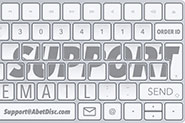Copyright Basics for Music
What Every Artist Needs to Know

As an author of a brand new song, you know how it feels to pour your heart and soul into something beautiful that the world can then enjoy. The only thing is — before you send your new creation off to stardom, you need to ensure that it is well protected by copyright laws. Otherwise the product of your hard work will be vulnerable to piracy, and you may end up losing the rights to its ownership.
Copyrighting is a legal form of protection offered to authors of various intellectual property. When it comes to music, there are a few basics that will help you better understand the process of copyrighting your original works — such as songs and music.
The law is structured so that once you have your song or musical notes down on paper, or recorded on a CD, it actually creates a copyright — as long as you have it in a “tangible’ format. The problem arises when someone else has the same song on paper — then you would actually have to prove that you had your copy first! To solve this problem, original works need to be registered with the Library of Congress www.loc.gov, and even then you are not fully protected against claims of authorship for your music.
That’s why there are so many intellectual property lawyers who like to take on complicated copyright cases and argue them in court…Fees for unlawful use of copyrighted music can run in the tens of thousands of dollars, so it’s no small laughing matter. Music industry is a multi-billion dollar industry, and there are heavy penalties in place to prevent people from stealing others’ intellectual property.
Once you have copyrighted your song or music, you will hold the exclusive rights to do the following:
Artists often go through a music publishing company, whereby they enter into a contract for the publisher to promote, distribute, and sell your music on your behalf. In this case, you basically assign the copyright to the publisher, and they in turn take their cut of the profits. Because of this, it is in their best interest to sell as many licensed copies of your music as possible — the more they sell, the bigger their profit margin is.
Another interesting copyright emerged in the early 70’s — which is called a “master recording copyright.’ It copyrights the way your song is originally recorded. If someone wants to use your music in their public work (like a motion picture), you can request that they pay two separate copyright fees — one for the music, and one for the master recording.
If you record your new song with a major record label, then that company will be able to hold a master recording copyright and collect any future royalties from the use of your song and music in any public work — advertisements, movies, and so on.
Find out more about the copyright process by visiting the U.S. Copyright Office’s website: www.copyright.gov




